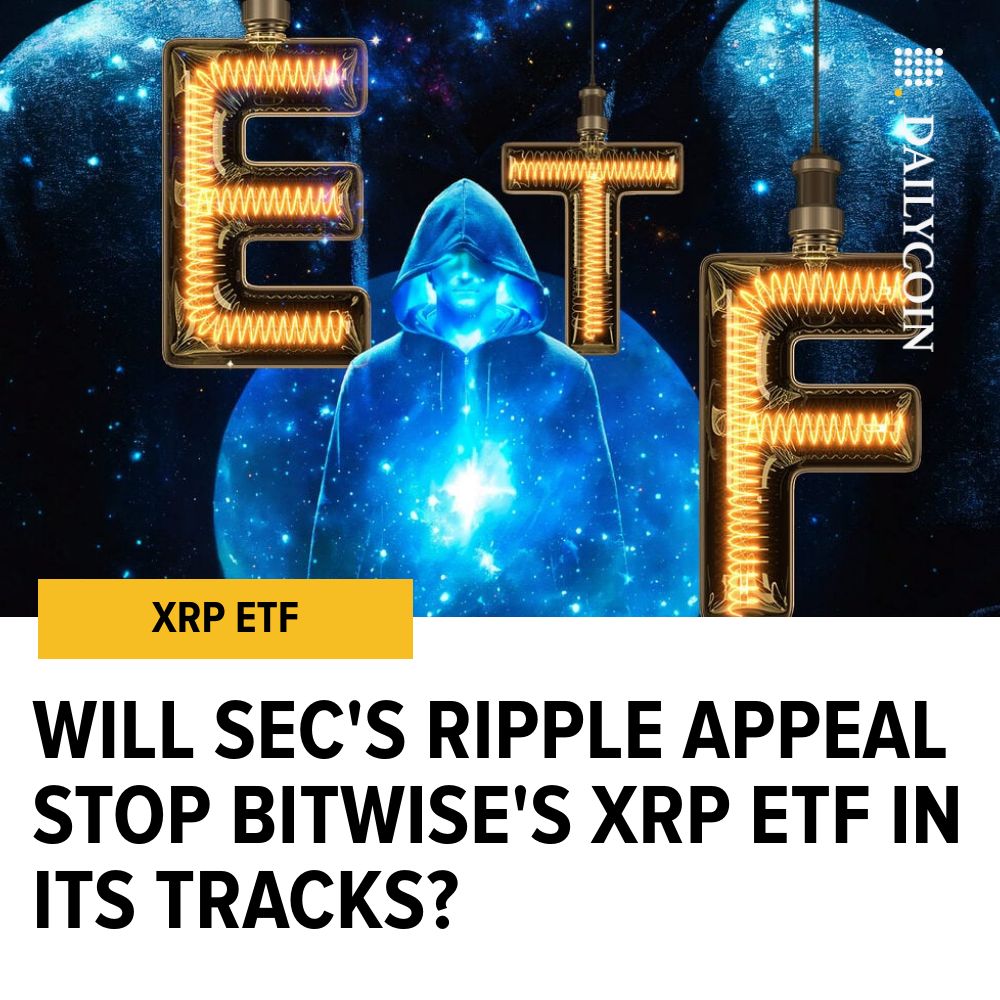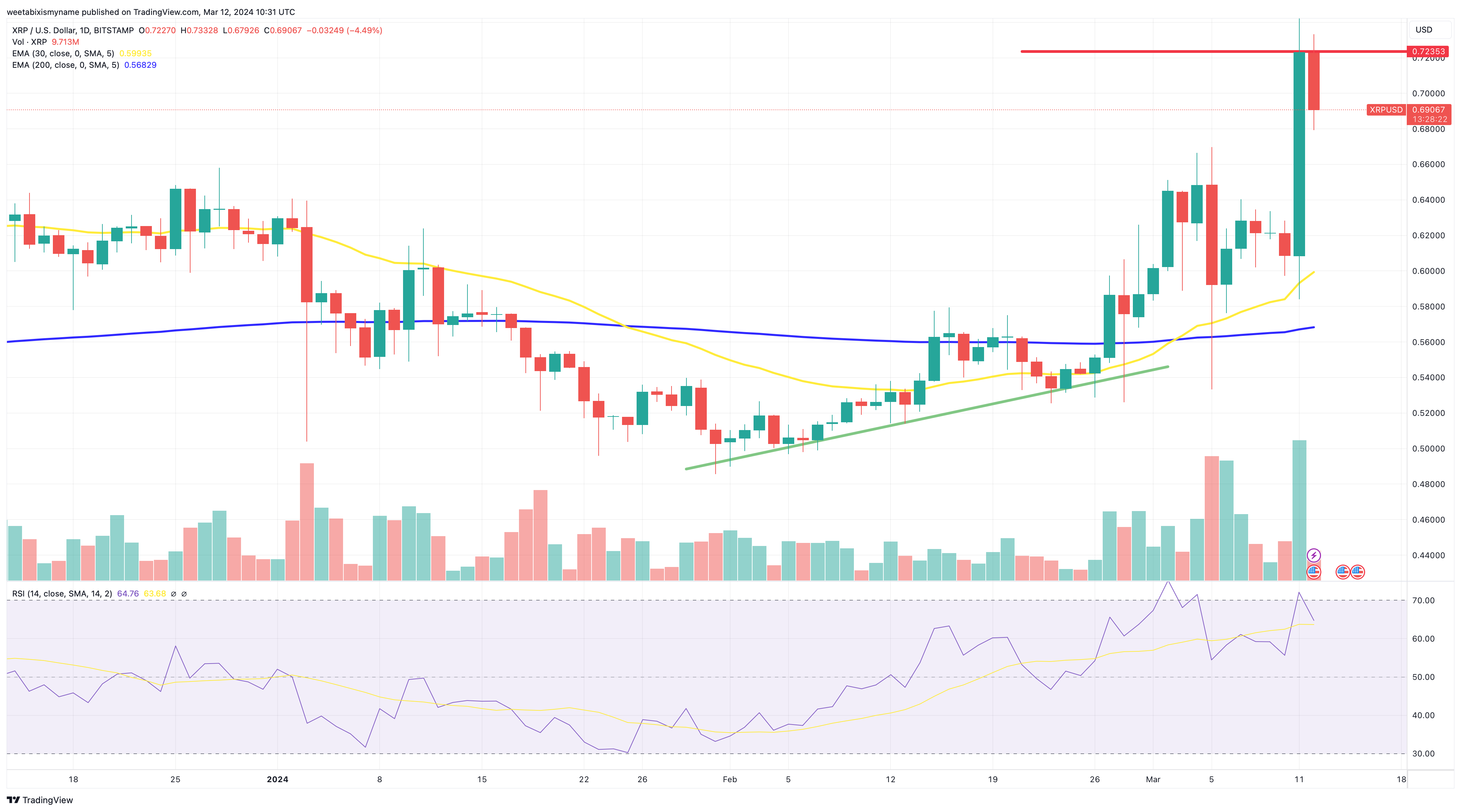Ripple's XRP: Navigating The ETF Landscape And SEC Uncertainty

Table of Contents
The Allure of an XRP ETF
The potential approval of an XRP ETF holds significant appeal for both institutional and retail investors. An XRP exchange-traded fund would offer several key benefits, primarily increased accessibility and liquidity within a regulated framework. Currently, direct investment in XRP involves navigating exchanges and dealing with the inherent risks associated with unregulated digital asset markets. An XRP ETF would change this landscape significantly.
- Easier access for retail investors: Investing in XRP would become significantly simpler for individual investors, eliminating the need for setting up accounts on various cryptocurrency exchanges.
- Increased price discovery and market efficiency: A regulated ETF would likely lead to greater price transparency and efficiency due to increased trading volume and market depth.
- Potential for higher trading volume: The availability of an XRP ETF could dramatically increase trading volume, attracting a wider range of investors and potentially boosting the price of XRP itself.
- Enhanced regulatory oversight (if approved): The ETF structure provides a layer of regulatory compliance, offering investors a degree of protection not typically found in direct cryptocurrency investments.
- Attraction of institutional investors leading to price stability: The launch of an XRP ETF could unlock significant institutional investment, leading to potentially greater price stability and reduced volatility.
The current lack of an approved XRP ETF fuels the demand for regulated exposure to this cryptocurrency, making the ongoing legal battles particularly impactful for potential investors.
The SEC's Stance on XRP and its Implications
The SEC's lawsuit against Ripple Labs, alleging that XRP is an unregistered security, is the primary obstacle to the approval of an XRP ETF. The outcome of this case will significantly influence the regulatory landscape for XRP and the likelihood of ETF approval.
- Summary of the SEC's arguments against Ripple: The SEC argues that Ripple’s sales and distribution of XRP constitute an unregistered securities offering, violating federal securities laws. Their argument centers on the Howey Test, a legal framework used to define what constitutes a security.
- Potential outcomes of the lawsuit and their impact on XRP's classification as a security: A ruling in favor of the SEC could solidify XRP’s classification as a security, significantly hindering the approval of an XRP ETF. Conversely, a ruling in favor of Ripple could open the door for ETF applications.
- How a ruling in favor of Ripple could pave the way for XRP ETF approval: A victory for Ripple could provide the necessary legal clarity for ETF providers to confidently file applications, accelerating the process of bringing an XRP ETF to market.
- How a ruling against Ripple could further delay or prevent XRP ETF approval: An SEC victory would likely create significant regulatory hurdles and uncertainty, potentially delaying or even preventing the approval of an XRP ETF indefinitely.
- The uncertainty this creates for potential investors: The ongoing legal battle creates significant uncertainty for investors, making it challenging to assess the risk and potential rewards associated with XRP investments.
Analyzing the Legal Arguments
The core of the SEC vs. Ripple case revolves around the application of the Howey Test to XRP. The SEC argues that XRP meets the criteria of an investment contract, citing aspects of Ripple's distribution and sales practices. Ripple, conversely, maintains that XRP is a decentralized digital asset and not a security, highlighting its operational aspects and widespread adoption within the crypto ecosystem.
- How the "Howey Test" applies to XRP: This test determines whether an investment is a security based on four elements: investment of money, in a common enterprise, with a reasonable expectation of profits, derived from the efforts of others. The application of this test to XRP is at the heart of the legal dispute.
- Discussion of Ripple's defense strategy: Ripple's defense largely hinges on establishing that XRP functions as a decentralized digital asset, not a centrally controlled investment scheme.
- Analysis of legal precedents and their relevance: The legal arguments draw upon precedents set in other securities cases, particularly those involving cryptocurrencies.
Navigating the Regulatory Landscape
The regulatory landscape surrounding cryptocurrencies remains complex and constantly evolving. The approval of an XRP ETF will depend significantly on the SEC's interpretation of XRP’s status and the broader regulatory environment.
- Comparison with Bitcoin and Ethereum ETF applications: The approval processes for Bitcoin and Ethereum ETFs can provide some insight, but the specific circumstances surrounding XRP add significant complexity.
- Discussion of different regulatory bodies' approaches globally: Regulatory approaches towards cryptocurrencies vary significantly across jurisdictions, highlighting the potential for different regulatory outcomes depending on the location of the ETF provider.
- Potential for different regulatory outcomes in different jurisdictions: An XRP ETF might be approved in certain jurisdictions before others, depending on their regulatory frameworks.
The role of self-regulation within the cryptocurrency industry is also a significant factor influencing the approval of any crypto ETF. The establishment of robust self-regulatory organizations could contribute positively to the regulatory process.
Investing Strategies in the Face of Uncertainty
Investing in XRP, given the ongoing regulatory uncertainty, requires a cautious and strategic approach. This is not financial advice; rather, it's a discussion of potential strategies.
- Diversification strategies to mitigate risk: Diversifying investments across various asset classes is crucial to mitigate the risk associated with the volatility of XRP.
- Importance of thorough due diligence: Investors should conduct thorough research, understanding the inherent risks associated with XRP and the regulatory uncertainty surrounding it.
- Understanding the risks associated with investing in unregulated assets: It’s crucial to be aware of the potential for significant losses and the lack of investor protections typical in regulated markets.
- Monitoring regulatory developments closely: Stay updated on the SEC lawsuit's progress and any changes in regulatory frameworks impacting cryptocurrencies.
- Considering alternative investment vehicles (e.g., staking, DeFi): Exploring alternative ways to engage with the XRP ecosystem can offer diversified exposure.
Conclusion
The future of XRP ETFs remains intertwined with the outcome of the SEC's lawsuit against Ripple. While the potential benefits of an XRP ETF are significant – increased liquidity, accessibility, and institutional investment – the regulatory uncertainty introduces considerable risk. Investors should carefully weigh the potential rewards against the inherent risks before making any investment decisions. Stay informed about the legal developments and consider a diversified approach to manage risk in this evolving landscape. Continue researching the XRP ETF market for the latest updates and news. Understanding the potential implications of the SEC's position on XRP ETFs is crucial for navigating this dynamic market.

Featured Posts
-
 Xrp Price Prediction Whales 20 M Buy Fuels Speculation
May 08, 2025
Xrp Price Prediction Whales 20 M Buy Fuels Speculation
May 08, 2025 -
 A Comprehensive Look At The Best Krypto Stories
May 08, 2025
A Comprehensive Look At The Best Krypto Stories
May 08, 2025 -
 Angels Losing Streak Reaches Five As Mike Trout Exits With Knee Issue
May 08, 2025
Angels Losing Streak Reaches Five As Mike Trout Exits With Knee Issue
May 08, 2025 -
 Luis Enrique Largoi Pese Yje Nga Psg
May 08, 2025
Luis Enrique Largoi Pese Yje Nga Psg
May 08, 2025 -
 Penny Pritzker The Billionaire Behind The Harvard Admissions Battle
May 08, 2025
Penny Pritzker The Billionaire Behind The Harvard Admissions Battle
May 08, 2025
Latest Posts
-
 Dwp Issues Warning Letters Uk Benefits Could Be Stopped
May 08, 2025
Dwp Issues Warning Letters Uk Benefits Could Be Stopped
May 08, 2025 -
 Urgent Dwp Sending Letters Benefits At Risk For Uk Households
May 08, 2025
Urgent Dwp Sending Letters Benefits At Risk For Uk Households
May 08, 2025 -
 Impact Of Dwp Overhaul On Universal Credit Payments
May 08, 2025
Impact Of Dwp Overhaul On Universal Credit Payments
May 08, 2025 -
 Dwp Benefit Stoppage Four Word Letters Warning Uk Households
May 08, 2025
Dwp Benefit Stoppage Four Word Letters Warning Uk Households
May 08, 2025 -
 Dwp Alert Verify Your Bank Details 12 Benefits May Be Affected
May 08, 2025
Dwp Alert Verify Your Bank Details 12 Benefits May Be Affected
May 08, 2025
